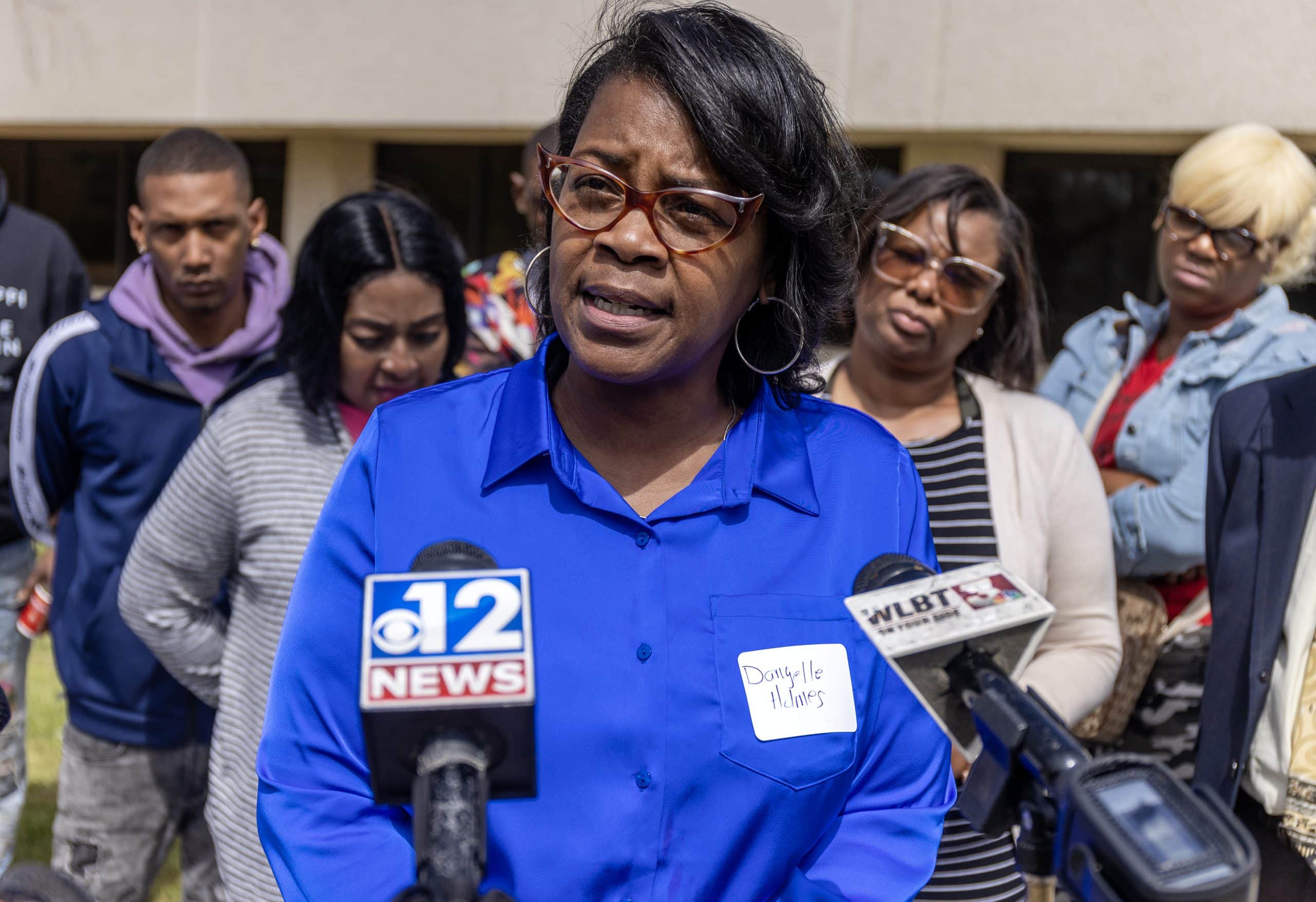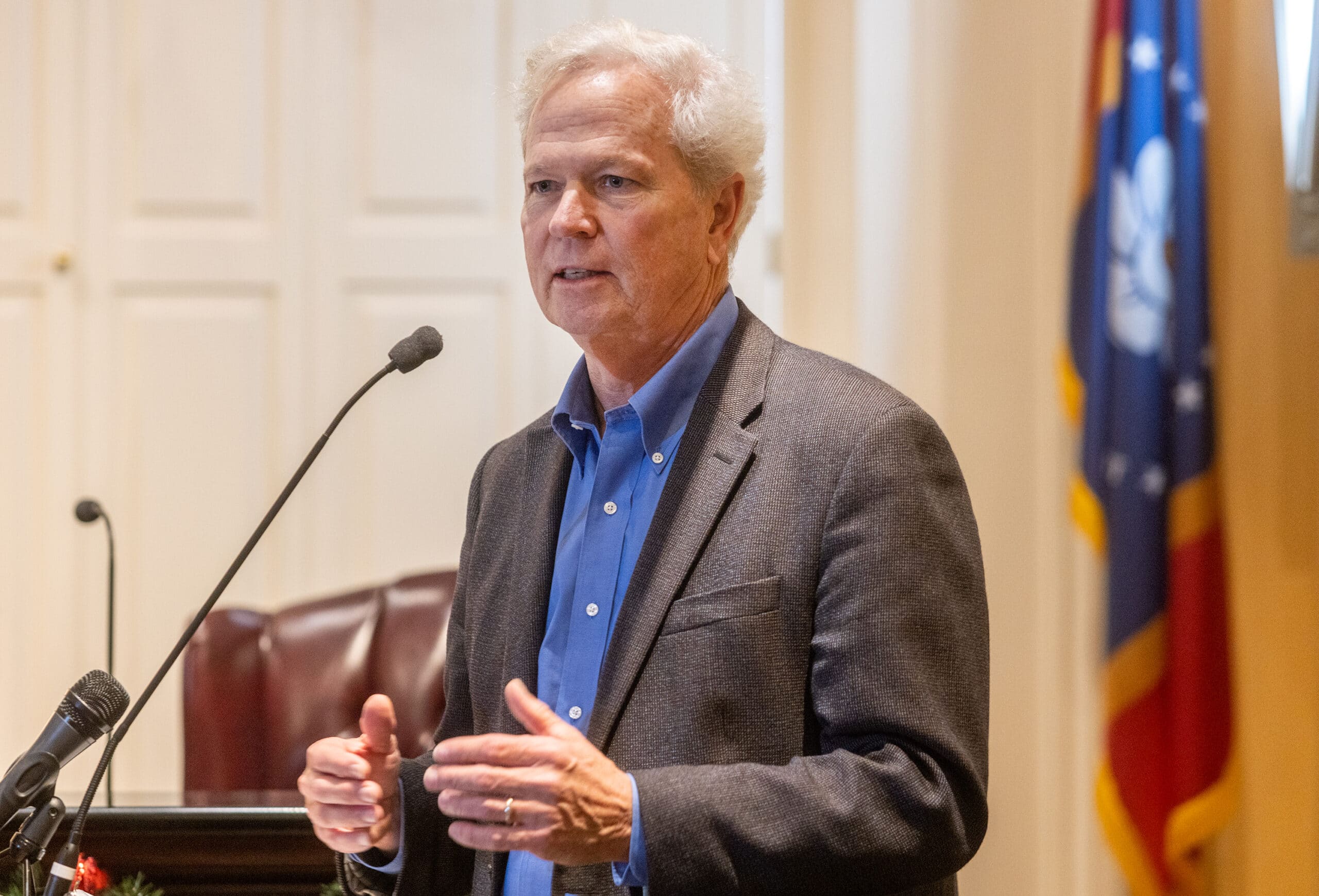Mississippi Today
Federal judge hears residents’ input on JXN Water’s work thus far

The U.S. District Court audience saw the gamut of Judge Henry Wingate's moods over a two-day status conference updating him on the latest with Jackson's water system.
The tedious proceedings covered a wide range of issues Wingate sought answers to, including water quality and public engagement.
Wingate initially called the conference after City Attorney Catoria Martin relayed in previous meetings that members of the public were concerned with how the system has been handled in the seven months since third-party manager Ted Henifin assumed control of Jackson's water utility.
At times, the Jackson-native judge was affable, sharing memories of marching with Medgar Evers and serving on a board at Tougaloo College. Other times, he was less patient. Wingate called out Jackson Mayor Chokwe Antar Lumumba multiple times, including over having side conversations and for using his cellphone during proceedings, despite others having their phones out as well.
Advocates and community members, as they told the court, are specifically frustrated over how little communication there's been between Henifin's company, JXN Water, and the public about how money has been spent, how contract work has been decided, and Henifin's persistent statements that the water is safe to drink despite residents seeing discolored and odorous water from their taps.

Rukia Lumumba, co-founder of the Mississippi Rapid Response Coalition — as well as Jackson Mayor Chokwe Antar Lumumba's sister — requested Wingate allow a community ambassador to engage with the court and Jackson water in future decision-making.
“We're too often only considered after decisions have been made,” she said about public involvement.
Rukia Lumumba, who also is a candidate for House District 72 in Hinds and Madison counties, requested that Wingate make JXN Water subject to public record laws. Despite having control of a public utility and spending government dollars, JXN Water is a non-government entity and has broad authority under Wingate's order last year. The company isn't subject to public record or contract procurement laws.
Danyelle Holmes, National Social Justice organizer with the Mississippi Poor People's Campaign, asked Wingate to release all contracts, salaries and resumes of companies JXN Water has hired thus far.
With a small staff of just five employees, Henifin said his plan is to rely heavily on contracting to carry out the water system rehabilitation.
Based on press releases and events, JXN Water has publicized at least three contracts it's executed: one with Stantec to repair water line leaks, one with a call center in Rankin County to create a 24/7 helpline, and another with Jacobs Engineering to staff the water treatment plants.
Otherwise, JXN Water has put out little information about its contracts, such as what bids they've received, exact terms of the contracts and other details that a government entity would have to share with taxpayers.
Residents also told Wingate they were disappointed that Henifin hired out-of-state companies for contracts and didn't establish a call center in Jackson. Henifin responded that his priority is to work with qualified companies who can help immediately. He added that he's worked with local firms whenever possible and will continue to seek work from Black-owned businesses.
Wingate and Henifin continually pointed to the progress that's been made in a short period: nearly 200 water leak repairs, 90 valves closed and normal water pressure for almost every home. Henifin said some homes in south Jackson still have pressure issues because of their distance from the treatment plant, and that he's planning to eventually put those homes on the city's well system.
Water quality
After last month's status conference when Henifin repeated that the water is safe to drink, residents expressed skepticism to the media and in social media posts, showing images of brown water from their taps.
Color and odor are what Henifin called “secondary” standards, meaning they don't indicate the water is unsafe to drink. But as Rukia Lumumba told the court Thursday, residents might not know that, and she suggested holding educational sessions to explain the city's water testing and why it's safe despite appearances.
“If I'm looking at brown water, I wouldn't think it's safe,” Holmes said in her testimony.
Wingate responded that he wouldn't want to drink that water either.

Holmes also argued that, just because water is safe leaving the plant, it doesn't mean that the water is safe at people's homes, where aging pipes are more likely to carry lead. In response, Wingate questioned who should be responsible for fixing pipes on private property. Later in the hearing, Martin, the city's attorney, said that, while the city couldn't spend its own money to fix pipes on private property, there are federal programs that make such funding available, including $15 billion from the Bipartisan Infrastructure Law.
‘We still have much room for improvement‘
Speakers during the status conference emphasized they wanted Jacksonians to have more involvement in Henifin's decision-making, and that they felt let down with how little public engagement there's been from JXN Water in recent months.
Brooke Floyd, director of the JXN People's Assembly, said she lost pressure or water completely three times in the last month and a half at her northeast Jackson home. She wondered why she hadn't received a boil water notice, which she'd typically finds on the state Department of Health's website.
Henifin has tried to overhaul the way the city issues boil water notices. In the past, he explained, the city could only test water pressure from its treatment plants and couldn't narrow down which parts of Jackson actually needed to boil their water.
Despite establishing a new 24/7 call center — which residents can reach at (601) 500-5200 — Henifin admitted “we still have much room for improvement with communications.” He also said in a press release that JXN Water has a “blind spot” in keeping Latino residents informed.
This article first appeared on Mississippi Today and is republished here under a Creative Commons license.
Mississippi Today
2024 Mississippi legislative session not good for private school voucher supporters
Despite a recent Mississippi Supreme Court ruling allowing $10 million in public money to be spent on private schools, 2024 has not been a good year for those supporting school vouchers.
School-choice supporters were hopeful during the 2024 legislative session, with new House Speaker Jason White at times indicating support for vouchers.
But the Legislature, which recently completed its session, did not pass any new voucher bills. In fact, it placed tighter restrictions on some of the limited laws the state has in place allowing public money to be spent on private schools.
Notably, the Legislature passed a bill that provides significantly more oversight of a program that provides a limited number of scholarships or vouchers for special-needs children to attend private schools.
Going forward, thanks to the new law, to receive the vouchers a parent must certify that their child will be attending a private school that offers the special needs educational services that will help the child. And the school must report information on the academic progress of the child receiving the funds.
Also, efforts to expand another state program that provides tax credits for the benefit of private schools was defeated. Legislation that would have expanded the tax credits offered by the Children's Promise Act from $8 million a year to $24 million to benefit private schools was defeated. Private schools are supposed to educate low income students and students with special needs to receive the benefit of the tax credits. The legislation expanding the Children's Promise Act was defeated after it was reported that no state agency knew how many students who fit into the categories of poverty and other specific needs were being educated in the schools receiving funds through the tax credits.
Interestingly, the Legislature did not expand the Children's Promise Act but also did not place more oversight on the private schools receiving the tax credit funds.
The bright spot for those supporting vouchers was the early May state Supreme Court ruling. But, in reality, the Supreme Court ruling was not as good for supporters of vouchers as it might appear on the surface.
The Supreme Court did not say in the ruling whether school vouchers are constitutional. Instead, the state's highest court ruled that the group that brought the lawsuit – Parents for Public Schools – did not have standing to pursue the legal action.
The Supreme Court justices did not give any indication that they were ready to say they were going to ignore the Mississippi Constitution's plain language that prohibits public funds from being provided “to any school that at the time of receiving such appropriation is not conducted as a free school.”
In addition to finding Parents for Public Schools did not have standing to bring the lawsuit, the court said another key reason for its ruling was the fact that the funds the private schools were receiving were federal, not state funds. The public funds at the center of the lawsuit were federal COVID-19 relief dollars.
Right or wrong, The court appeared to make a distinction between federal money and state general funds. And in reality, the circumstances are unique in that seldom does the state receive federal money with so few strings attached that it can be awarded to private schools.
The majority opinion written by Northern District Supreme Justice Robert Chamberlin and joined by six justices states, “These specific federal funds were never earmarked by either the federal government or the state for educational purposes, have not been commingled with state education funds, are not for educational purposes and therefore cannot be said to have harmed PPS (Parents for Public Schools) by taking finite government educational funding away from public schools.”
And Southern District Supreme Court Justice Dawn Beam, who joined the majority opinion, wrote separately “ to reiterate that we are not ruling on state funds but American Rescue Plan Act (ARPA) funds … The ARPA funds were given to the state to be used in four possible ways, three of which were directly related to the COVID -19 health emergency and one of which was to make necessary investments in water, sewer or broadband infrastructure.”
Granted, many public school advocates lamented the decision, pointing out that federal funds are indeed public or taxpayer money and those federal funds could have been used to help struggling public schools.
Two justices – James Kitchens and Leslie King, both of the Central District, agreed with that argument.
But, importantly, a decidedly conservative-leaning Mississippi Supreme Court stopped far short – at least for the time being – of circumventing state constitutional language that plainly states that public funds are not to go to private schools.
And a decidedly conservative Mississippi Legislature chose not to expand voucher programs during the 2024 session.
This article first appeared on Mississippi Today and is republished here under a Creative Commons license.
Mississippi Today
On this day in 1925


MAY 19, 1925

Malcolm X was born Malcolm Little in Omaha, Nebraska. When he was 14, a teacher asked him what he wanted to be when he grew up and he answered that he wanted to be a lawyer. The teacher chided him, urging him to be realistic. “Why don't you plan on carpentry?”
In prison, he became a follower of Nation of Islam leader Elijah Muhammad. In his speeches, Malcolm X warned Black Americans against self-loathing: “Who taught you to hate the texture of your hair? Who taught you to hate the color of your skin? Who taught you to hate the shape of your nose and the shape of your lips? Who taught you to hate yourself from the top of your head to the soles of your feet? Who taught you to hate your own kind?”
Prior to a 1964 pilgrimage to Mecca, he split with Elijah Muhammad. As a result of that trip, Malcolm X began to accept followers of all races. In 1965, he was assassinated. Denzel Washington was nominated for an Oscar for his portrayal of the civil rights leader in Spike Lee's 1992 award-winning film.
This article first appeared on Mississippi Today and is republished here under a Creative Commons license.
Did you miss our previous article…
https://www.biloxinewsevents.com/?p=359877
Mississippi Today
On this day in 1896


MAY 18, 1896

The U.S. Supreme Court ruled 7-1 in Plessy v. Ferguson that racial segregation on railroads or similar public places was constitutional, forging the “separate but equal” doctrine that remained in place until 1954.
In his dissent that would foreshadow the ruling six decades later in Brown v. Board of Education, Justice John Marshall Harlan wrote that “separate but equal” rail cars were aimed at discriminating against Black Americans.
“In the view of the Constitution, in the eye of the law, there is in this country no superior, dominant, ruling class of citizens,” he wrote. “Our Constitution in color-blind and neither knows nor tolerates classes among citizens. In respect of civil rights, all citizens are equal before the law. The humblest is the peer of the most powerful. The law … takes no account of his surroundings or of his color when his civil rights as guaranteed by the supreme law of the land are involved.”
This article first appeared on Mississippi Today and is republished here under a Creative Commons license.
Did you miss our previous article…
https://www.biloxinewsevents.com/?p=359301
-
SuperTalk FM6 days ago
Martin Lawrence making 3 stops in Mississippi on comedy tour
-
Our Mississippi Home5 days ago
Beat the Heat with Mississippi’s Best Waterparks
-
SuperTalk FM2 days ago
State auditor cracking down on Mississippians receiving unemployment benefits
-
Our Mississippi Home6 days ago
Charlie’s U-Pik: Opening Soon for the Summer Season
-
Mississippi News Video4 days ago
Jackson has a gang problem
-
Kaiser Health News5 days ago
Medicaid ‘Unwinding’ Decried as Biased Against Disabled People
-
Local News2 days ago
Family files lawsuit after teen’s suicide in Harrison County Jail
-
Mississippi Today3 days ago
On this day in 1950









































